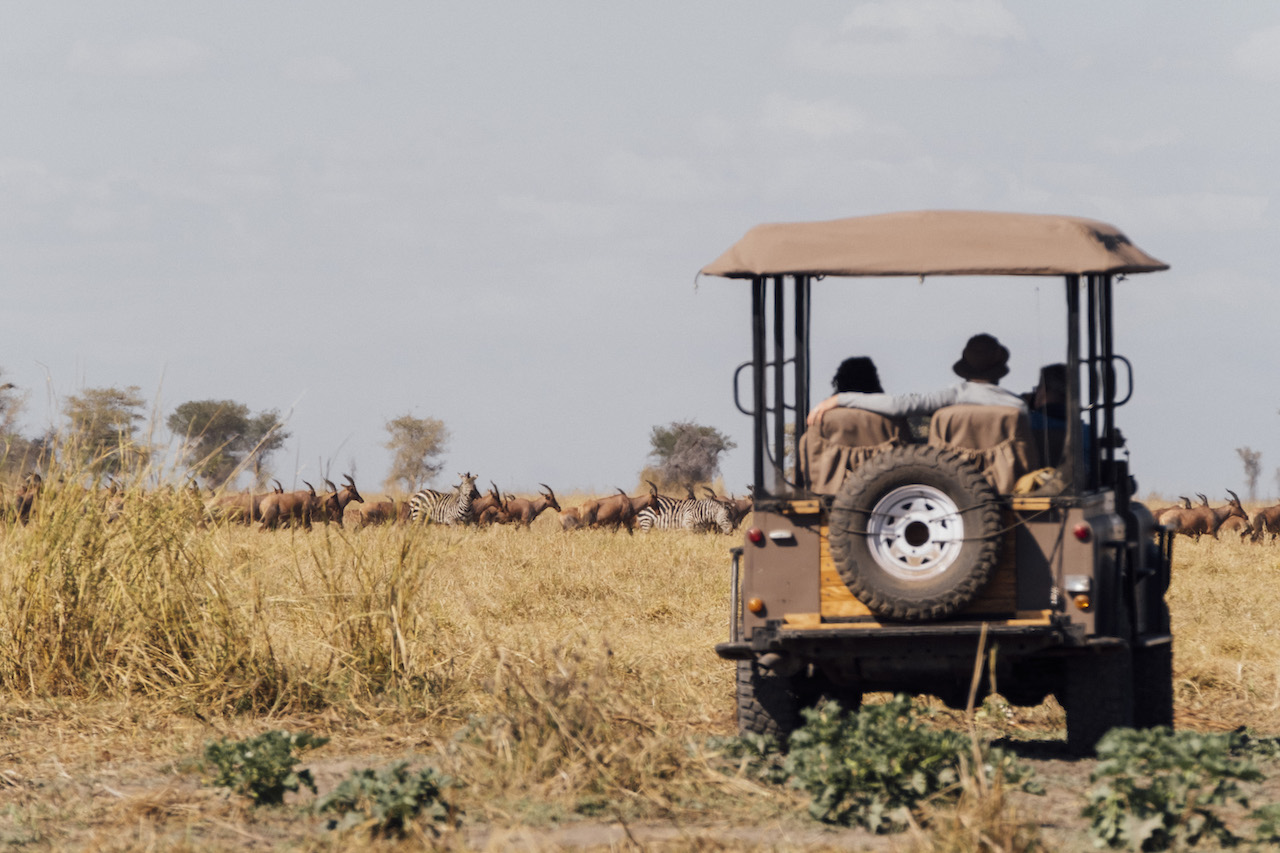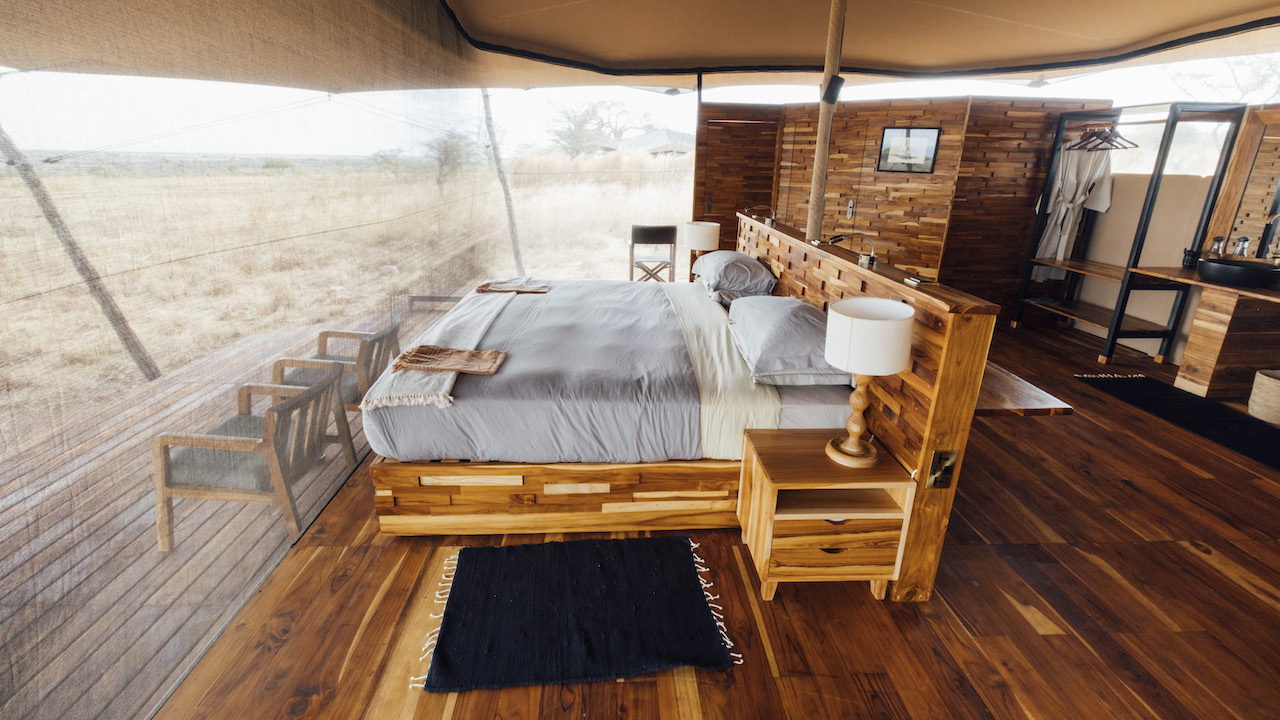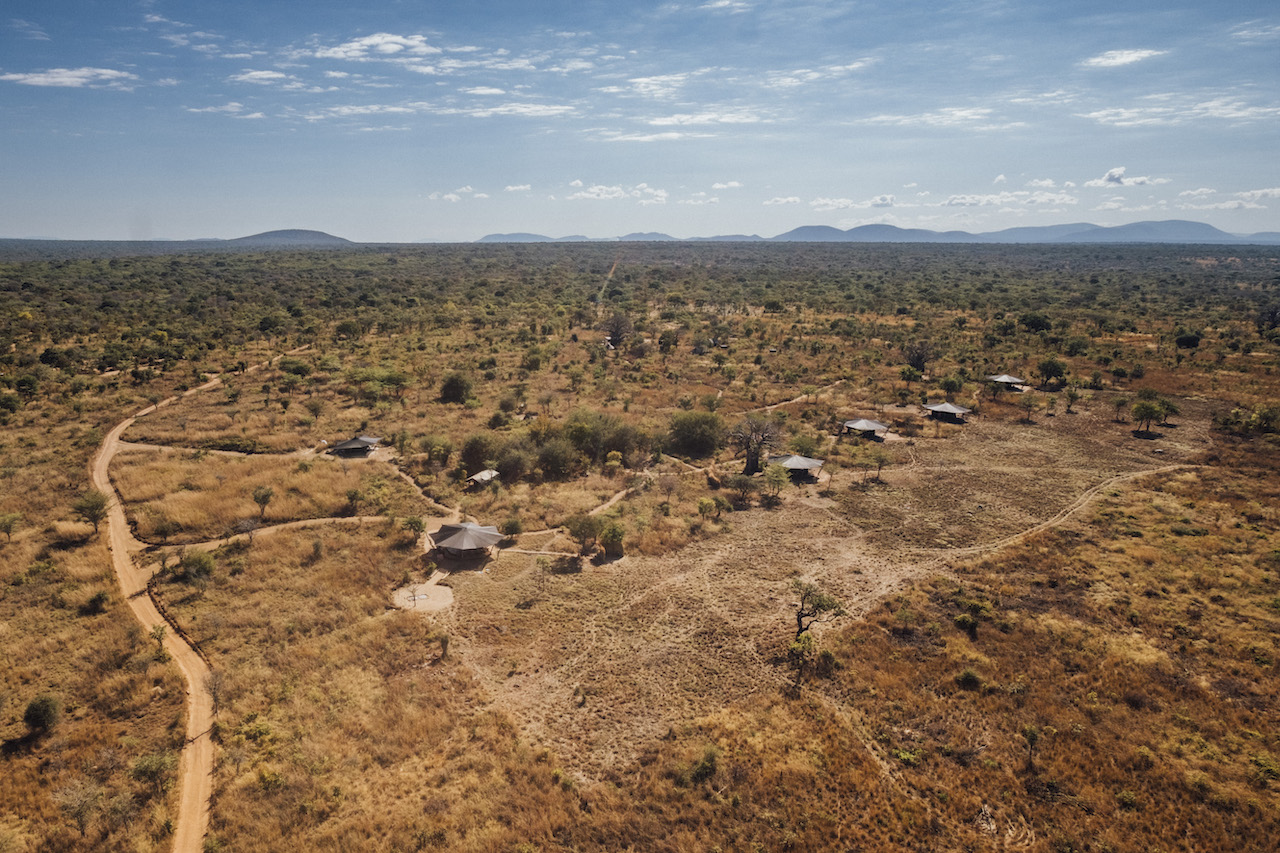Asilia Africa has opened its most pioneering safari project yet, Usangu Expedition Camp in a remote corner of Ruaha National Park, Tanzania.
The four-tent camp will be the first tourism operation in the area and offers guests the chance to be part of a hands-on conservation experience
The new Usangu Expedition Camp four solar-powered, en-suite tents are designed with panoramic views of the floodplains ahead with shade cloth walls to give 180-degree views. Featuring king-size beds, hot showers and biodegradable amenities, they have all the creature comforts expected of an Asilia safari.
The camp’s two safari vehicles are upcycled old Land Rovers that have been re-built from the ground up in Tanzania. Purpose-built for comfort, bush driving and remarkable off-road capability; the vehicles are powered by green alcohol fuel made from molasses, a by-product of the existing sugar industry, sourced from a nearby plantation. If necessary though the engine management system allows the v8 engine to run both petrol, ethanol, or any combination of the two fuels.
Usangu can be explored on game drives, on foot and on boating safaris. With the nearest camp over 60km away guests will not see another vehicle as they explore an area four times the size of Kenya’s Maasai Mara. The vast floodplains are home to the largest herds of topi in Africa, groups of over one thousand are often seen. Moving with them are large groups of eland, sable and roan and flocks of ostrich. Predators include lion and leopard.

At night the bush comes alive thanks to handheld thermal monocular cameras. Guests or the guide can scan the bush, causing no disturbance to any game, and imagery is relayed back to an iPad in the vehicle. The camera allows an in-depth view of the bush after dark, opening up a whole new world of sightings including porcupine, serval, African wildcat and hyena. Unlike traditional spotlights, the thermal monocular is undetectable by wildlife and causes no disturbance to behaviour.
In addition to the traditional safari activities, Usangu Expedition Camp offers the rare opportunity to partake in hands on conservation activities. Usangu Expedition Camp is part of an ambitious program to understand the health of the Usangu eco-system and what lives there. The first-ever three-way partnership between a tourism company (Asilia), Tanzania National Parks Authority and TAWIRI (the Tanzanian Wildlife Research Institute), was launched in 2018 to conduct a comprehensive biodiversity audit of the area. The Usangu wetlands are an area of critical conservation importance; they are the source of The Great Ruaha River, the lifeblood of south-eastern Tanzania. The river provides water to Ruaha National Park then joins the Kilombero River to create the Rufiji Delta which is at the heart of Nyerere National Park. The water is not just essential to the wilderness and wildlife but is also the water source for the communities along its watercourse and via a network of hyrdro electric dams provides electricity to much of the south of the country. Despite its importance, the area was an unprotected hunting reserve for almost 100 years until it was added to Ruaha National Park in 2006.
To build a picture of the biodiversity of the area every guest receives a camera trap at the beginning of their stay. This is placed out in the bush and on the last night, the images captured are displayed. This information feeds into the bio-diversity audit to help Tanzanian conservationists and authorities build an accurate picture of what is living in the wetland. Equally important is tracking the research subjects fitted with GPS collars such as lions and recording their movements. Guests are encouraged to download the iNaturalist app and join a global online community of naturalists (both amateur and professional). Here they can post their sightings, have them verified by the community and further help to build a picture of Usangu’s bio-diversity. For an additional donation, there is the opportunity to join a wildlife collaring expedition as the team track, dart and collar lion, leopard, elephant and wild dog and a variety of antelope species.

Usangu Expedition Camp’s mission is to prove that wild areas have value and that when wild places thrive so do the communities living alongside them. Pos-Covid, eco-tourism matters more than ever in Tanzania. According to a recent study by the African Leadership University’s School of Wildlife Conservation pre-Covid in 2019 Tanzania earned USD 2.557 billion from 1.5 million visitors and tourism employed 623,000 people. Jobs declined by almost half a million (477,000) during the pandemic. These jobs are often in remote rural areas where the only alternative way to make a living is subsistence farming or poaching. Usangu Expedition Camp’s team is all Tanzanian from the local community and five of the team are in formal employment for the first time.
An example of this is trainee guide Anderson Pakomyus Mesilla. Until three years ago Anderson survived on subsistence farming and poaching honey in the national park. He entered employment 3 years ago as an ‘’eco-warrior’’ at Asilia. Despite speaking no English he persevered and was selected for the Usangu team and spent 3 months in the bush building roads. His English improved and he joined Asilia’s guide training program and now as the camp opens he is a trainee guide.
This pioneering conservation project is the latest initiative in what is now a 6-year partnership between Asilia and British businessman Sir Jim Ratcliffe, founder and Chairman of INEOS. The partnership began with the development of Jabali Ridge and Jabali Private House in Ruaha National Park and Roho ya Selous in Nyerere National Park (formerly the Selous Game Reserve) which opened in 2017. Together Asilia and Ratcliffe have made the largest commitment to southern Tanzania of any safari company. This commitment is crucial as these huge wilderness areas receive only a fraction of the visitors (and revenue) of the more famous northern parks such as the Serengeti and Tarangire. Pre-COVID the joint venture generated over US$ 250 000 annually in park revenue in Ruaha and over US$ 150 000 in Nyerere and created more than 100 jobs. Together with NORFUND, Ratcliffe has invested over half a million dollars in protecting and researching Usangu.
Usangu Expedition Camp is open from June to November and starts at US$ 700 per person per night with a minimum three-night stay and a compulsory conservation donation of US$ 250 per person per day
For more Safari stories click here
Want to Stay Up to Date? Follow us on Facebook or Instagram or Sign Up for our Bi-Weekly Newsletter.

